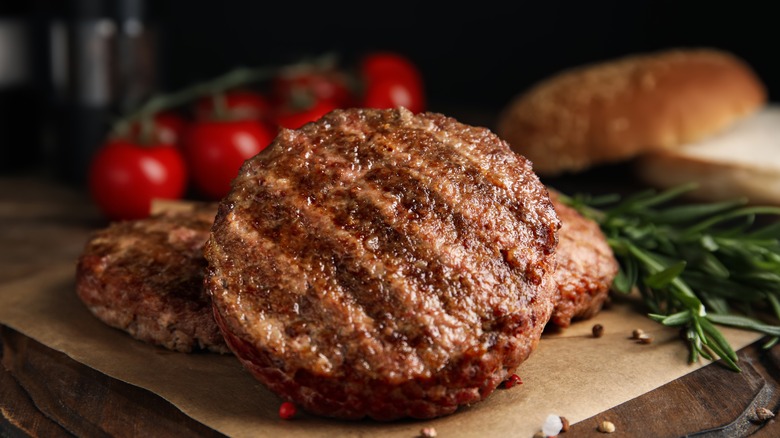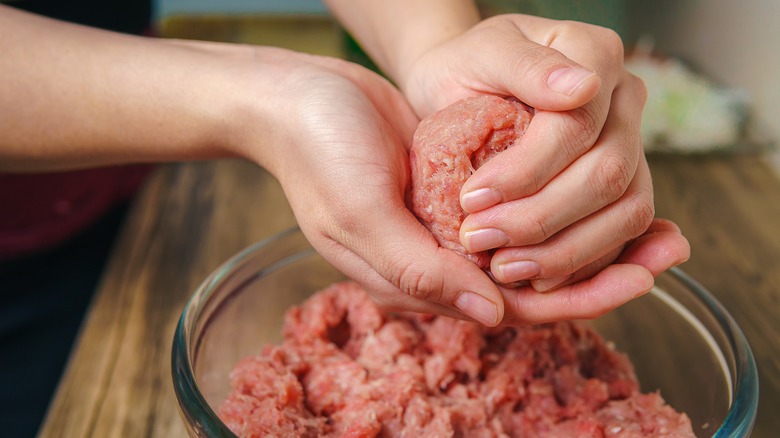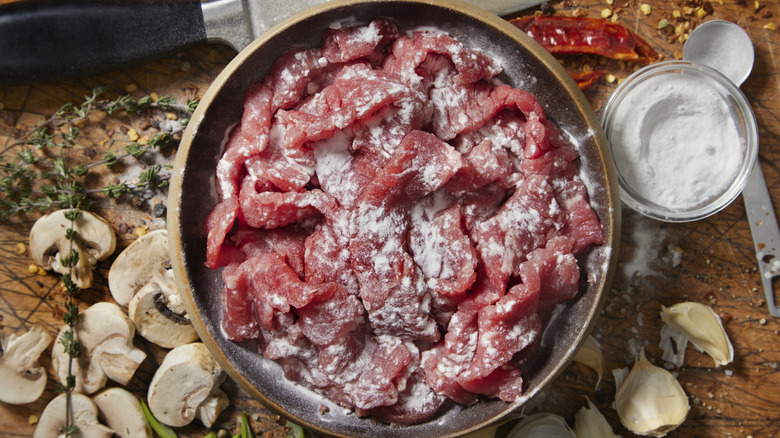Why You Need To Start Adding Baking Soda To Your Burger Meat
There's nothing like a good burger. Satisfying, savory, and with a variety of potential toppings, the American culinary staple and classic diner favorite is delicious at every degree of doneness. But whether your preference is a juicy, medium-rare patty or you emphatically swear by the robust flavor of a well-done patty, chances are you've excitedly bitten into a burger once or twice only to find it unpleasantly tough and way too chewy.
But what if there was an infallible method by which to ensure your ground beef recipe ends up juicy and tender? There is, and you likely have its main ingredient your kitchen cabinet right now: baking soda. That's right, among the many unexpected ways to cook with baking soda, it turns out that using the familiar kitchen staple as a quick and effective meat tenderizer can preserve the juiciness of your ground beef, as well as chicken, steak, and other meats. Because baking soda neutralizes the acid in the meat and prevents it from becoming tough when cooked, using it as your go-to meat tenderizer just might be the game-changing hack to the best burger you've never cooked.
Adding baking soda to your ground beef
Because baking soda raises the pH of the beef, preventing the proteins from releasing liquid, your hamburger meat will retain its moisture while it cooks, resulting in more tender, silky-textured meat which will brown better and faster. Still, making delicious, juicy ground beef for burgers and other dishes begins with choosing your beef wisely — you'll want to use fresh ground beef which has at least a 20% fat content such as ground chuck, also known for its fantastic flavor.
Just before forming the best burger patties, you'll want to simply stir in a mixture of ½ teaspoon of baking soda and 1 tablespoon of water (so the baking soda gets evenly spread) for each pound of ground beef, then let it rest for five to 15 minutes. Then season your meat well, and prepare to make some of the best burgers of your at-home culinary career.
To maximize the tenderness of your meat, handle your patties as gently as possible — and keep any mix-ins, such as onions or breadcrumbs, to a minimum so that distributing them evenly doesn't cause you to over-handle your meat. Additionally, when it's time to cook the meat, be sure to add your patties to a hot pan. A cold pan will steam the meat as it heats up, and cause the meat to turn gray-ish. Instead, you want to sear your ground meat, which will brown it beautifully.
Using baking soda to tenderize and brown other meats
Ground beef isn't the only meat that benefits from baking soda's tenderizing and browning properties. You can also use it on chicken (particularly chicken breast, which is leaner, and thus, drier than thighs) or steak. For cuts of steak, for example, you can use your baking soda as a dry brine — simply rub it all over your steak, ensuring that the entirety of your meat is covered, and store it in your refrigerator for three to five hours. Then you're free to rinse the baking soda off, dry your meat, and cook as usual.
Alternatively, for smaller cuts of meat, such as chunks of chicken for stir-fry, you can make a wet brine by dissolving about 1 teaspoon of baking soda in ½ cup of water for 12 ounces of your meat. Then, you'll simply soak your meat in the solution for about 15 minutes, rinse and dry thoroughly, and you're ready to cook some seriously tender meat. The baking soda solution will tenderize much faster than a traditional brine, which can take up to 30 minutes to begin working. Tender, juicy meat in less time? Sounds like a win.


